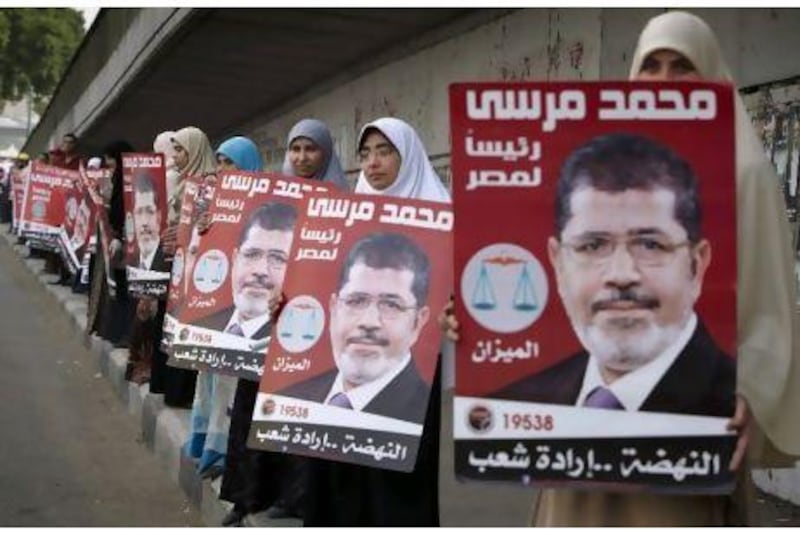CAIRO // With just four days before a key presidential election in Egypt, alliances are being struck by candidates vying for the country's top position.
Abdallah Al Ashaal, a former diplomat and professor of law is among the 13 candidates for the presidency. Last week, he urged his supporters to vote for Mohammed Mursi, the Muslim Brotherhood candidate.
"Despite what people say about this being a battle between Islamists and secularists, I believe this is a race between the forces of the revolution and the old regime," he said on Thursday. "Mohammed Mursi is our best chance … This is not about one man's ego. You have to sacrifice for the country."
If he continued his campaign for the presidency, he said he would only serve to split the vote among the group of "revolution" candidates.
Mr Al Ashaal's election calculus may spread further, according to analysts. Mazen Hassan, a professor at Cairo University who is studying the country's democratic transition, said the major alliances would likely be struck after the first round of voting on Wednesday and Thursday. If one candidate does not win 51 per cent of the vote, it will go to a run-off a month later.
"That's when we could see some important deals struck that would affect the elections," Mr Hassan said.
The little-known candidate Mohamed Fawzy Issa, a lawyer and former police officer, announced on Wednesday that he was withdrawing from the race and supporting Amr Moussa, the former foreign minister of Egypt. Technically, no candidate can withdraw because the deadline for removing a name from the ballots was April 8, but candidates can publicly endorse competitors.
Of the candidates, four have emerged as the top contenders: Mr Moussa; Abdel Moneim Aboul Fotouh, a self-styled moderate Islamist and former member of the Muslim Brotherhood; Ahmed Shafik, a former air force commander who was briefly prime minister after last year's uprising that led to Hosni Mubarak's resignation; and Mr Mursi, who became the Muslim Brotherhood's candidate after Khairat Al Shater was disqualified from the race.
With two of the 13 throwing their weight behind the four front-runners, the remaining candidates must choose between continuing their own campaigns with little prospect of success or supporting the lead candidates.
Mr Al Ashaal, who is not a member of the Muslim Brotherhood, said he supported Mr Mursi because he was a "great thinker" and represented the best chance for the revolutionary movement to stand against members of the old regime.
"Egypt will be moderate under Mursi," he said. "I trust that he will not force religion on anyone."
Mr Al Ashaal expects Mohammed Selim Al Awa, an Islamic constitutional scholar running for president, to support Mr Mursi next week. However, Mr Al Awa's campaign has made no announcements about plans to support another candidate.
Mr Al Ashaal's most scathing criticism is for Mr Shafik and Mr Moussa, whom he cast as the ruling military council's favourites to take the helm of Egypt and prevent the revolutionary principles that sparked the uprising from being established.
"If one of these men win, I believe there could be greater instability in the country and a second revolution against the continuation of the Mubarak regime," he said. "A vote for them is to revive the traditions of Mubarak and to try to make the revolution a brief moment of instability in the history of Egypt, not a momentous change."
The challenge for the "revolutionary camp" in Egypt is its inability to unify behind a candidate who can win the race, he said.





